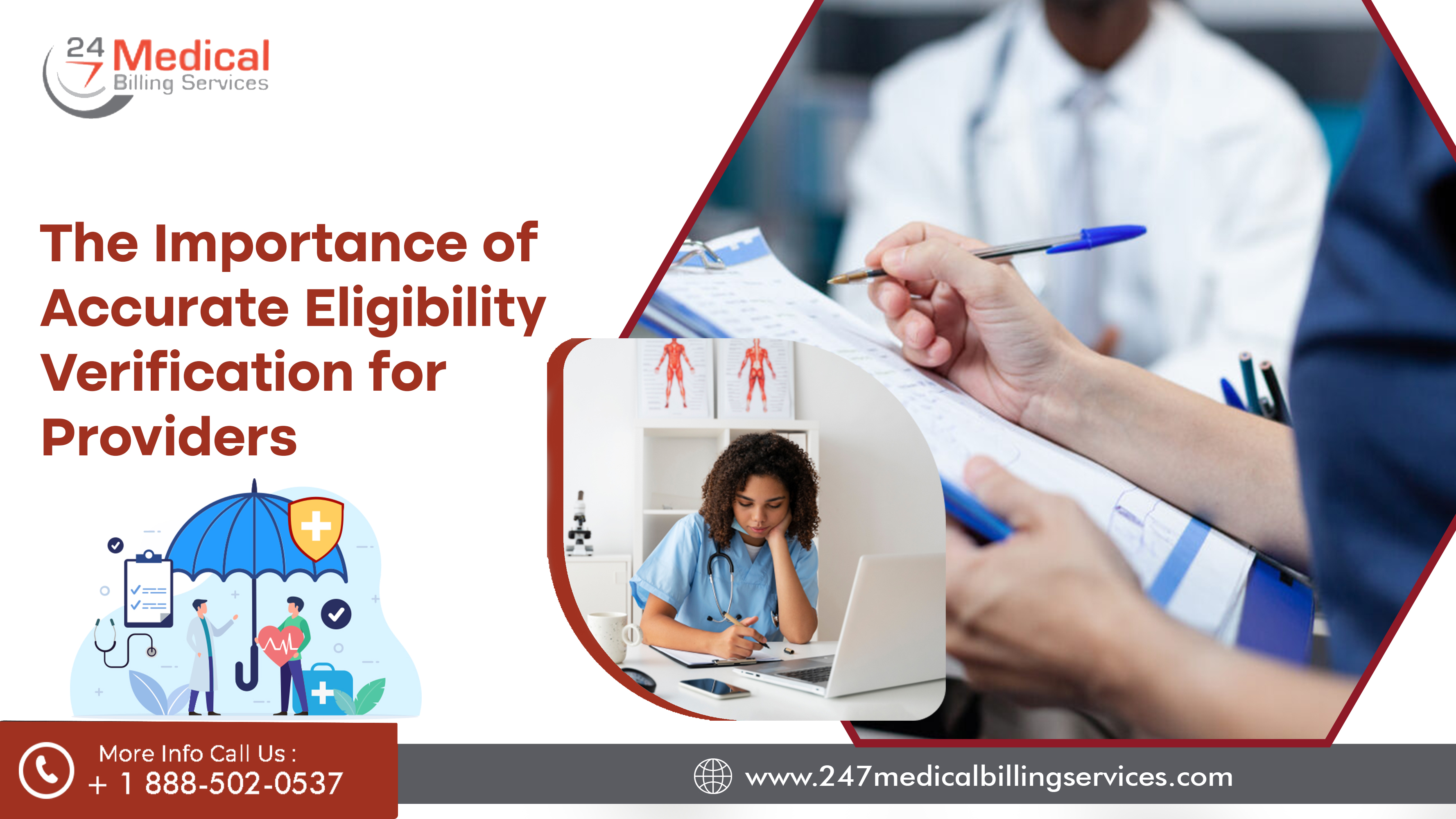
The Importance of Accurate Eligibility Verification for Providers
In the complex medical billing scenario, accurate eligibility verification serves as a cornerstone for successful revenue cycle management. It ensures that healthcare providers confirm a patient’s insurance coverage and benefits before delivering medical services. This proactive approach minimizes claim denials, enhances financial stability, and improves the patient experience by clarifying potential costs upfront. Let’s delve into why accurate eligibility verification is essential for healthcare providers and explore the critical aspects that make this process indispensable:
Key Aspects of Accurate Eligibility Verification
To maximize the benefits of eligibility verification, healthcare providers must adopt a systematic and thorough approach. The following are the critical elements of accurate eligibility verification:
a. Collecting Complete Patient Information
Accurate eligibility verification begins with collecting comprehensive patient details, including their name, date of birth, insurance policy number, and group number. Any discrepancies in this information can lead to errors in the verification process and subsequent claim denials. Therefore, meticulous data collection is a non-negotiable aspect of effective verification.
b. Real-Time Verification
Electronic systems to verify insurance eligibility in real-time ensure that providers access the most up-to-date patient coverage information. These systems minimize errors caused by outdated insurance data and provide immediate insights into coverage limitations or changes.
c. Benefit Verification
Beyond confirming coverage, verifying the specifics of a patient’s insurance benefits is essential. Understanding details such as deductibles, co-pays, out-of-pocket limits, and coverage for particular treatments or services allows providers to align their services with the patient’s financial responsibilities.
d. Regular Updates
Insurance policies and coverage terms often change, making it imperative for providers to maintain systems that regularly update patient insurance information. By conducting periodic verification checks, providers can ensure the accuracy of their records and avoid surprises during claim submission.
Benefits of Accurate Eligibility Verification
1. Reduced Claim Denials
Claim denials represent one of the most significant administrative and financial challenges for healthcare providers. According to industry reports, up to 30% of medical claims are denied on the first submission, with each denied claim costing an average of $25 to reprocess. Accurate eligibility verification can significantly mitigate this issue by ensuring that claims are submitted correctly the first time.
By confirming the patient’s insurance details upfront, providers can identify services covered under the insurance plan, requirements for pre-authorization, and the applicability of co-pays or deductibles. This information allows providers to tailor their services according to the patient’s coverage, preventing claims for non-covered services and reducing the chances of denials. Consequently, fewer claims are rejected, and providers experience a streamlined reimbursement process.
2. Improved Financial Stability
Healthcare providers operate in a financially volatile space, where claim denials or delayed payments can disrupt cash flow and threaten operational stability. Accurate eligibility verification plays a critical role in securing a predictable revenue stream by minimizing errors in claim submissions and ensuring timely payments.
When providers verify a patient’s eligibility before rendering services, they can accurately estimate the patient’s financial responsibility and secure upfront payments for deductibles or co-pays. This proactive measure reduces instances of bad debt and improves revenue collection rates. Therefore, enhanced financial stability allows providers to focus on delivering quality care while maintaining their operations seamlessly.
3. Enhanced Patient Experience
In today’s patient-centric healthcare model, transparency about costs is a critical determinant of patient satisfaction. Accurate eligibility verification fosters trust between patients and providers by offering clear information about coverage, potential out-of-pocket costs, and pre-authorization requirements before treatment begins.
Patients benefit from avoiding unexpected medical bills and understanding their financial obligations in advance. This clarity not only reduces patient stress but also encourages them to seek timely medical care, knowing the costs are manageable. In turn, providers strengthen patient relationships and improve satisfaction ratings, fostering loyalty and positive referrals.
4. Streamlined Billing Processes
Medical billing involves intricate processes that require meticulous attention to detail. Errors in eligibility verification can disrupt this workflow, leading to billing delays and increased administrative burdens. Accurate eligibility verification streamlines the billing process by ensuring that all necessary information—such as insurance coverage, deductibles, and co-pay amounts—is readily available at the time of claim submission.
By integrating real-time electronic verification systems, providers can automate eligibility checks, reduce manual data entry errors, and accelerate claim submission timelines. These efficiencies allow administrative staff to focus on higher-value tasks, such as patient engagement and compliance management, thereby enhancing overall practice productivity.
5. Compliance with Regulations
Healthcare regulations regarding patient billing and insurance coverage are stringent and continuously evolving. Accurate eligibility verification ensures compliance by adhering to payer policies and documenting the verification process thoroughly. Failure to comply with these regulations can lead to audits, penalties, or legal liabilities, further straining a provider’s resources.
By implementing robust eligibility verification practices, healthcare organizations can minimize risks associated with non-compliance. This proactive approach safeguards providers from potential financial and reputational damages while promoting ethical billing practices.
Challenges and Solutions
Despite its importance, eligibility verification comes with challenges, including discrepancies in patient data, frequent changes in healthcare regulations, and administrative burdens. However, solutions such as outsourcing to 24/7 Medical Billing Services can address these issues effectively.
Outsourcing eligibility verification offers a practical solution to improve efficiency and accuracy. 24/7 Medical Billing Services leverage advanced technology and industry expertise to handle the verification process seamlessly. This approach allows providers to:
- Reduce Costs: Outsourcing eliminates the need for in-house resources dedicated to eligibility verification, resulting in significant cost savings.
- Enhance Efficiency: Expert service providers streamline the verification process, enabling faster claim submissions and reducing billing errors.
- Focus on Patient Care: By delegating administrative tasks, providers can concentrate on delivering quality care to their patients.
- Optimize Revenue Cycle: Accurate and timely verification improves cash flow and minimizes disruptions in revenue collection.
Outsourcing eligibility verification further amplifies these benefits by providing cost-effective, efficient, and accurate services tailored to the needs of hospitals. In an era where financial and regulatory pressures are mounting, investing in accurate eligibility verification is a vital step toward sustainable success in healthcare delivery.

.png)